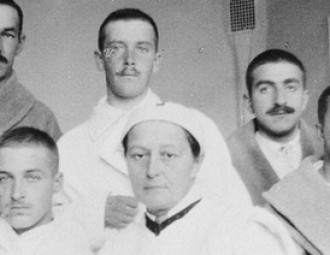Aleh Dziarnovich: The first female surgeon is the Belarusian Princess Vera Gedroitz

The life history of a non-trivial native of a Belarusian family is worthy of a whole adventure novel.
Historian Aleh Dziarnovich has quite accidentally got interested in the fate of this woman, when eighteen months ago he came across a doctoral thesis in medicine, which had the name "Remote results of surgeries on inguinal hernias." The author of the dissertation, MD, among other things, expresses their vision for the miserable state of the industry) in the Middle Ages. According to the author’s thesis, the doctors in the XVI century were divided into two "camps": "barbers", who had poor classification and merely amputated everything that could be cured had they proper education, and those who, having received an excellent education at Padua and Bologna wouldn’t practice medicine. This, strictly speaking, was the complaint of the author of the dissertation to the latter.
The author’s name is Vera Gedroitz, whose family takes origin in Belarus. This woman has absolutely unique biography. Vera Gedroitz was born in Russia, studied at the Bryansk grammar school. She took interest in medicine very early, but that was hard for her to pursue in the Russian Empire back then. So in 1894, Vera entered a sham marriage with a Russian officer Nikolai Belozerov, which was her way to get a passport, which gives her the opportunity to travel abroad freely. And she went to Lausanne to the famous surgeon Caesar Roux, to study and work as his assistant and even used to be the assistant professor at the university.
Her active spirits and leftist sympathies brought Vera back to the pre-revolutionary Russia, where she asserted her diploma at the University of Moscow and got a divorce, becoming the first female surgeon in the Russian Empire.
- She introduced a lot of innovations in the health sector, performed abdominal surgeries, and participated in the Russo-Japanese War, during which she was creating field hospitals, - Aleh Dziarnovich says.
The king's court noticed the woman-medic and was the head of the Tsarskoye Selo palace hospital, thus attending to the royal family, and even went into a severe conflict with the king's favorite Grigory Rasputin.
- Later in her diaries she described his dirty beard and hair with aversion, - Aleh Dziarnovich says.
Vera was very close to her brother. When he died suddenly in 1910, it was her personal tragedy. At this time she performed in the Russian literary movement under the pseudonym Sergei Gedroitz.
When the World War I started, Vera was a chief physician of the palace hospital. There is a rich collection of images, where she teaches the tsar’s daughters how to give first aid.
After the February Revolution Vera Gedroitz was forced to leave St. Petersburg – she was close to the tsar family, for which the Provisional Government commissars persecuted her. Vera went to front in Kiev. There in 1923 she became a professor of medicine, and in 1929 – the Head of the Department of Surgery at the Faculty of the Kiev Medical Institute.
Soon, Vera met with the countess Maria Nirad and created a lesbian family with her. In the Soviet Union back then, it was fully real, as the Soviet power was trying to eliminate the institute of family. According to the memoirs of the Kiev time Vera was large and overweight and dressed like a man: she was wearing jackets and ties, men’s hats, and short haircuts; she was also referring to herself in masculine pronouns. Mary Nirad’s children from his first marriage lived with them and felt an obvious dislike for Gedroitz.
Over the last years of the Kiev period the female surgeon moved from abdominal to cancer surgeries. She didn’t believe in the viral origin of cancer, and considered it the cause of abnormal growth of residual germ cells. But due to a wicked twist of fate a disease with which Vera Gedroitz fought brutally avenged her. In 1932, she was diagnosed with cancer in the last stage, and she passed away. The woman-medic was buried in Kiev, and grateful patients came to her grave for a long time afterwards.
-
03.01
-
07.10
-
22.09
-
17.08
-
12.08
-
30.09



























